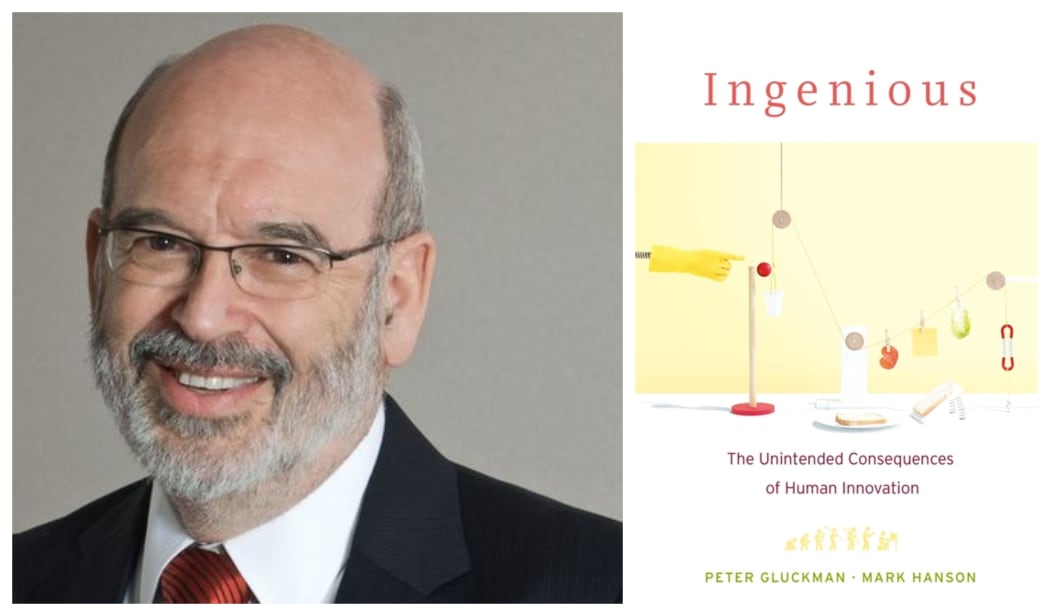Humans are very good at inventing things but very bad at anticipating the harmful and unintended consequences of that inventiveness, says scientist Sir Peter Gluckman, co-author of the new book Ingenious.
Continual, rapid change is not easy to cope with and to weather it humanity will need both individual and social resilience, he tells Kathryn Ryan.

Photo: Public domain
The pace of innovation has gotten faster and faster, and there are really no constraints on how we use our powerful ability to invent and develop, Gluckman says.
“In biological evolution, there are some constraints. You can't grow a bigger head than your body can hold on your neck.
“But in cultural evolution, there are effectively no constraints except the moral constraints of society, and if those constraints are let loose then things happen.”
For millions of years we've placed limits on public discourse, Gluckman points out, but in just the last few decades those limits have been eroded.
“[Before that erosion] discourse within groups remained relatively civil. We had laws like slander and libel laws, we had religious prescriptions against speaking ill of our neighbour. With the development of the Internet, and in particular of social media and the anonymity on social media, we saw a destruction of social or civil discourse. So much of the discourse now in social media would never been accepted in the pre-internet age.”
Society is changing at an unprecedented speed, he says.
“The transitions we're going through now, the speed of them, the pervasiveness of them... The digital technology interacts with every aspect of our lives as individuals, within the social groups and within the organisational structures in which our societies operate, be it a democracy or any other structure.”
The regulatory response to the super-charged digital age we live in has been sadly lacking, Gluckman says.
“It's actually very difficult, once technologies get out of hand, to find ways to put the genie back in the bottle. And that's the difficulty we have.
“New Zealand has some of the weakest oversight on the digital regime, on how data is used, of any liberal democracy. And that worries me that we haven't got a proper oversight system around data and digital ethics and governance.”
Technology isn’t going away so we need to be adaptable and create frameworks that protect society, Gluckman says,
“We need to be more pre-emptive in thinking about what kind of societies will be created in this rapidly-changing world. We've got to accept that technologies will always be developed, but we've got to make sure that as a whole societies flourish in this environment, and they're not damaged too much in this environment.”
There is a lot of evidence that people do not cope well with very rapid change, and what we're experiencing now is also cumulative and increasingly disruptive, Gluckman says.
“In the last decade, the rates of mental health disorders in young people between the ages of 15 and 25 have doubled in every western country where it's documented.
“Now, why has there been so much rapid change in mental health in the last decade? It's easy to say the internet or something else. It's much more complex than that.
“But it’s a sign that this rapidity of change is not easy to cope with.”

Photo: supplied
Individuals develop resilience to change in early childhood, he says.
“If we don't create the foundations in the first few years of life, we're unlikely to be as resilient to change, to the stresses that are inevitable as we move through this rapidly-changing world.
“One of the things that I feel strongly about is that we invest a lot of money from the taxpayer in early childhood education, but we don't really know whether we're doing it well.”
Developing good social skills in those early years is critical, Gluckman says,
“It's not so much about the cognitive skills of reading and writing, it's much more about the social skills of interacting, developing what's called the theory of mind, understanding each other in a social sense.
“It's those skills that turn out and are well-documented to be the skills that determine one's resilience and success in life, rather than the cognitive skills.”
Gluckman has no doubt we've now entered a dangerous 'post-fact' era where the fabric of society itself is at risk.
“I spent a lot of time with a philosopher who had worked with one of the major Silicon Valley companies, the headline companies, and his point was, if you talk to the bosses of some of those companies, they have no interest in the values of democracy.”
These companies are quite libertarian, he says, and would be comfortable with a “Brave New World”.
“The Brave New World by Aldous Huxley, which you remember was a very few powerful people in control, and everybody else in society being drugged - by the internet, perhaps?
“I think that we are at a point at which we need to think hard about the institutions of democracy. Philip Kitcher, the great philosopher, he used the term ‘vulgar democracy’ to refer to democracy where it has been manipulated, where opinion has been manipulated, not by honest discussion, but by misinformation.”
Protecting a true, representative and participatory democracy is one of our greatest challenges, Gluckman says,
“Let's not kid ourselves, the biggest threat we face as a society comes from the use of misinformation, which creates a very asymmetrical situation for ordinary citizens.”
Next month, the Centre For Informed Futures, which Gluckman has established, will open at University of Auckland.
He says the centre will take an apolitical approach to long-term issues such as social resilience, individual resilience, how societies make choices about technologies and whether to use them and creating adaptive regulatory mechanisms.
“[We will study] how we make the big and hard decisions about the trade-offs that will have to be made between different domains of our lives in order to maintain a sustainable planet and a sustainable society.”
Sir Peter Gluckman is president-elect of the International Science Council, a former Prime Minister's Chief Science Advisor, and a distinguished professor at the Liggins Institute of the University of Auckland.

